- Home
- Dan Simmons
Olympos t-2
Olympos t-2 Read online
Olympos
( Troy - 2 )
Dan Simmons
Helen of Troy is in mourning for her dead husband, Paris. Killed in single combat with the merciless Apollo. His body a scorched and blasted thing. Hockenberry, her lover, still sneaks from her bed after their nights of lovemaking. And the Gods still strike out from the besieged Olympos. Their single-molecule bomb casings quantum phase-shifting through the moravecs' force shield and laying waste to Ilium. Or so Hockenberry and the amusing little metal creature, Mahnmut, have tried to explain to her. Helen of Troy does not give a fig about machines. She must dress for the funeral. And man and the gods and the unknown players in this tragedy must prepare for the final act. And a battle that will decide the future of the universe itself.
Olympos
Dan Simmons
This novel is for Harold Bloom, who—in his refusal to collaborate in this Age of Resentment—has given me great pleasure.
How could Homer have known about these things? When all this happened he was a camel in Bactria!
—LUCIAN, The Dream
… the real-life history of the earth must in the last instance be a history of a really relentless warfare. Neither his fellows, nor his gods, nor his passions will leave a man alone.
—JOSEPH CONRAD, Notes on Life and Letters
O write no more the tale of Troy,
If earth Death’s scroll must be—
Nor mix with Laian rage the joy
Which dawns upon the free:
Although a subtler Sphinx renew
Riddles of death Thebes never knew.
Another Athens shall arise,
And to remoter time
Bequeath, like sunset to the skies,
The splendor of its prime;
And leave, if naught so bright may live,
All earth can take or Heaven can give.
—PERCY BLYTHE SHELLEY, Hellas
Part 1
1
Helen of Troy awakes just before dawn to the sound of air raid sirens. She feels along the cushions of her bed but her current lover, Hockenberry, is gone—slipped out into the night again before the servants wake, acting as he always does after their nights of lovemaking, acting as if he has done something shameful, no doubt stealing his way home this very minute through the alleys and back streets where the torches burn least bright. Helen thinks that Hockenberry is a strange and sad man. Then she remembers.
My husband is dead.
This fact, Paris killed in single combat with the merciless Apollo, has been reality for nine days—the great funeral involving both Trojans and Achaeans will begin in three hours if the god-chariot now over the city does not destroy Ilium completely in the next few minutes—but Helen still cannot believe that her Paris is gone. Paris, son of Priam, defeated on the field of battle? Paris dead? Paris thrown down into the shaded caverns of Hades without beauty of body or the elegance of action? Unthinkable. This is Paris, her beautiful boy-child who had stolen her away from Menelaus, past the guards and across the green lawns of Lacedaemon. This is Paris, her most attentive lover even after this long decade of tiring war, he whom she had often secretly referred to as her “plunging stallion full-fed at the manger.”
Helen slips out of bed and crosses to the outer balcony, parting the gauzy curtains as she emerges into the pre-dawn light of Ilium. It is midwinter and the marble is cold under her bare feet. The sky is still dark enough that she can see forty or fifty searchlights stabbing skyward, searching for the god or goddess and the flying chariot. Muffled plasma explosions ripple across the half dome of the moravecs’ energy field that shields the city. Suddenly, multiple beams of coherent light—shafts of solid blue, emerald green, blood red—lance upward from Ilium’s perimeter defenses. As Helen watches, a single huge explosion shakes the northern quadrant of the city, sending its shockwave echoing across the topless towers of Ilium and stirring the curls of Helen’s long, dark hair from her shoulders. The gods have begun using physical bombs to penetrate the force shield in recent weeks, the single-molecule bomb casings quantum phase-shifting through the moravecs’ shield. Or so Hockenberry and the amusing little metal creature, Mahnmut, have tried to explain to her.
Helen of Troy does not give a fig about machines.
Paris is dead. The thought is simply unsupportable. Helen has been prepared to die with Paris on the day that the Achaeans, led by her former husband, Menelaus, and by his brother Agamemnon, ultimately breach the walls, as breach they must according to her prophetess friend Cassandra, putting every man and boy-child in the city to death, raping the women and hauling them off to slavery in the Greek Isles. Helen has been ready for that day—ready to die by her own hand or by the sword of Menelaus—but somehow she has never really believed that her dear, vain, godlike Paris, her plunging stallion, her beautiful warrior-husband, could die first. Through more than nine years of siege and glorious battle, Helen has trusted the gods to keep her beloved Paris alive and intact and in her bed. And they did. And now they have killed him.
She calls back the last time she saw her Trojan husband, ten days earlier, heading out from the city to enter into single combat with the god Apollo. Paris had never looked more confident in his armor of elegant, gleaming bronze, his head flung back, his long hair flowing back over his shoulders like a stallion’s mane, his white teeth flashing as Helen and thousands of others watched and cheered from the wall above the Scaean Gate. His fast feet had sped him on, “sure and sleek in his glory,” as King Priam’s favorite bard liked to sing. But this day they had sped him on to his own slaughter by the hands of furious Apollo.
And now he’s dead, thinks Helen, and, if the whispered reports I’ve overheard are accurate, his body is a scorched and blasted thing, his bones broken, his perfect, golden face burned into an obscenely grinning skull, his blue eyes melted to tallow, tatters of barbecued flesh stringing back from his scorched cheekbones like… like… firstlings—like those charred first bits of ceremonial meat tossed from the sacrificial fire because they have been deemed unworthy. Helen shivers in the cold wind coming up with the dawn and watches smoke rise above the rooftops of Troy.
Three antiaircraft rockets from the Achaean encampment to the south roar skyward in search of the retreating god-chariot. Helen catches a glimpse of that retreating chariot—a brief gleaming as bright as the morning star, pursued now by the exhaust trails from the Greek rockets. Without warning, the shining speck quantum shifts out of sight, leaving the morning sky empty. Flee back to besieged Olympos, you cowards, thinks Helen of Troy.
The all-clear sirens begin to whine. The street below Helen’s apartments in Paris’s estate so near Priam’s battered palace are suddenly filled with running men, bucket brigades rushing to the northwest where smoke still rises into the winter air. Moravec flying machines hum over the rooftops, looking like nothing so much as chitinous black hornets with their barbed landing gear and swiveling projectors. Some, she knows from experience and from Hockenberry’s late-night rants, will fly what he calls air cover, too late to help, while others will aid in putting out the fire. Then Trojans and moravecs both will pull mangled bodies from the rubble for hours. Since Helen knows almost everyone in the city, she wonders numbly who will be in the ranks of those sent down to sunless Hades so early this morning.
The morning of Paris’s funeral. My beloved. My foolish and betrayed beloved.
Helen hears her servants beginning to stir. The oldest of the servants—the old woman Aithra, formerly queen of Athens and mother to royal Theseus until carried away by Helen’s brothers in revenge for the kidnapping of their sister—is standing in the doorway to Helen’s bedchamber.
“Shall I have the girls draw your bath, my lady?” asks Aithra.
Helen nods. She watches the skie
s brighten a moment more—sees the smoke to the northwest thicken and then lessen as the fire brigades and moravec fire engines bring it under control, watches another moment as the rockvec battle hornets continue to fling themselves eastward in hopeless pursuit of the already quantum-teleported chariot—and then Helen of Troy turns to go inside, her bare feet whispering on the cold marble. She has to prepare herself for Paris’s funeral rites and for seeing her cuckolded husband, Menelaus, for the first time in ten years. This also will be the first time that Hector, Achilles, Menelaus, Helen, and many of the other Achaeans and Trojans all will be present at a public event. Anything could happen.
Only the gods know what will come of this awful day, thinks Helen. And then she has to smile despite her sadness. These days, prayers to the gods go unanswered with a vengeance. These days, the gods share nothing with mortal men—or at least nothing except death and doom and terrible destruction carried earthward by their own divine hands.
Helen of Troy goes inside to bathe and dress for the funeral.
2
Red-haired Menelaus stood silent in his best armor, upright, motionless, regal, and proud between Odysseus and Diomedes at the forefront of the Achaean delegation of heroes gathered there at the funeral rites within the walls of Ilium to honor his wife-stealing enemy, Priam’s son, that shit-eating pig-dog, Paris. Every minute he stood there Menelaus was pondering how and when to kill Helen.
It should be easy enough. She was just across the broad lane and up the wall a bit, less than fifty feet from him opposite the Achaean delegation at the heart of the huge inner court of Troy, up there on the royal reviewing stand with old Priam. With luck, Menelaus could sprint there faster than anyone could intercept him. And even without luck, if the Trojans did have time to get between him and his wife, Menelaus would hack them down like weeds.
Menelaus was not a tall man—not a noble giant like his absent brother, Agamemnon, nor an ignoble giant like that ant-pizzle Achilles—so he knew he’d never be able to leap to the reviewing ledge, but would have to take the stairs up through the crowd of Trojans there, hacking and shoving and killing as he went. That was fine with Menelaus.
But Helen could not escape. The reviewing balcony on the wall of the Temple of Zeus had only the one staircase down to this city courtyard. She could retreat into the Temple of Zeus, but he could follow her there, corner her there. Menelaus knew that he would kill her before he went down under the attacks of scores of outraged Trojans—including Hector leading the funeral procession now coming into sight—and then the Achaeans and Trojans would be at war with one another again, forsaking their mad war against the gods. Of course, Menelaus’ life would almost certainly be forfeit if the Trojan War resumed here, today—as would Odysseus’, Diomedes’, and perhaps even the life of invulnerable Achilles himself, since there were only thirty Achaeans here at the pig Paris’s funeral, and thousands of Trojans present all around in the courtyard and on the walls and massed between the Achaeans and the Scaean Gate behind them.
It will be worth it.
This thought crashed through Menelaus’ skull like the point of a lance. It will be worth it—any price would be worth it—to kill that faithless bitch. Despite the weather—it was a cool, gray winter’s day—sweat poured down under his helmet, trickled through his short, red beard, and dripped from his chin, spattering on his bronze breastplate. He’d heard that dripping, spattering-on-metal sound many times before, of course, but it had always been his enemies’ blood dripping on armor. Menelaus’ right hand, set lightly on his silver-studded sword, gripped the hilt of that sword with a numbing ferocity.
Now?
Not now.
Why not now? If not now, when?
Not now.
The two arguing voices in his aching skull—both voices his, since the gods no longer spoke to him—were driving Menelaus insane.
Wait until Hector lights the funeral pyre and then act.
Menelaus blinked sweat out of his eyes. He didn’t know which voice this was—the one that had been urging action or the cowardly one urging restraint—but Menelaus agreed with its suggestion. The funeral procession had just entered the city through the huge Scaean Gate, was in the process of carrying Paris’s burned corpse—hidden now beneath a silken shroud—down the main thoroughfare to the center courtyard of Troy, where ranks upon ranks of dignitaries and heroes waited, the women—including Helen—watching from the reviewing wall above. Within a very few minutes, the dead man’s older brother Hector would be lighting the pyre and all attention would be riveted on the flames as they devoured the already burned body. A perfect time to act—no one will notice me until my blade is ten inches into Helen’s traitorous breast.
Traditionally, funerals for such royal personages as Paris, son of Priam, one of the Princes of Troy, lasted nine days, with many of the days taken up by funeral games—including chariot races and athletic competitions, usually ending in spear-throwing. But Menelaus knew that the ritual nine days since Apollo blasted Paris into charcoal had been taken up by the long voyage of carts and cutters to the forests still standing on Mount Ida many leagues to the southeast. The little machine-things called moravecs had been called on to fly their hornets and magical devices along with the cutters, providing force-shield defenses against the gods should they attack. And they had attacked, of course. But the woodcutters had done their job.
It was only now, on the tenth day, that the wood was gathered and in Troy and ready for the pyre, although Menelaus and many of his friends, including Diomedes standing next to him here in the Achaean contingent, thought that burning Paris’s putrid corpse on a funeral pyre was an absolute waste of good firewood since both the city of Troy and the miles of Achaean camps along the shore had been out of fuel for campfires for many months, so picked-over were the scrub trees and former forests surrounding Ilium itself ten years into that war. The battlefield was a stubble of stumps. Even the branches had long since been scavenged. The Achaean slaves were cooking dinners for their masters over dung-fueled fires, and that didn’t improve either the taste of meat or the foul mood of the Achaean warriors.
Leading the funeral cortege into Ilium was a procession of Trojan chariots, one by one, the horses’ hooves wrapped in black felt and raising little noise on the broad stones of the city’s thoroughfare and town square. Riding on these chariots, standing silent beside their drivers, were some of the greatest heroes of Ilium, fighters who’d survived more than nine years of the original war and now eight months of this more terrible war with the gods. First came Polydorus, another son of Priam’s, followed by Paris’s other half brother, Mestor. The next chariot carried the Trojan ally Ipheus, then Laoducus, son of Antenor. Following in their own jewel-bedecked chariots were old Antenor himself, down among the fighting men as always rather than up on the wall with the other elders, then the captain Polyphetes, then Sarpedon’s famed charioteer, Thrasmelus, standing in for the Sarpedon himself, co-commander of the Lycians, killed by Patroclus months ago when Trojans still fought Greeks rather than gods. Then came noble Pylartes—not, of course, the Trojan killed by Great Ajax just before the war with the gods began, but this other Pylartes who so often fights alongside Elasus and Mulius. Also in this procession are Megas’ son, Perimus, as well as Epistor and Melanippus.
Menelaus recognized them all, these men, these heroes, these enemies. He’d seen their contorted and blood-filled faces under bronze helmets a thousand times across the short deadly space of lance-thrust and sword-hack separating him from his twin goals—Ilium and Helen.
She’s fifty feet away. And no one will expect my attack.
Behind the muffled chariots came groomsmen leading the potential sacrificial animals—ten of Paris’s second-best horses and his hunting dogs, droves of fat sheep—a serious sacrifice these last, since both wool and mutton were growing scarce under the siege of the gods—and some old, shambling crooked-horned cattle. These cattle were not there for their pride of sacrifice—who was there to sacrifice to
now that the gods were enemies?—but there for their fat to make the funeral pyre burn brighter and hotter.
Behind the sacrificial animals came thousands of Trojan infantry, all in polished armor this dull winter’s day, their ranks running back out through the Scaean Gate and onto the plains of Ilium. In the midst of this mass of men moved Paris’s funeral bier, carried by twelve of his closest comrades-in-arms, men who would have died for Priam’s second-eldest son and who even now wept as they carried the massive palanquin for the dead.
Paris’s body was covered by a blue shroud and that shroud was already buried in thousands of locks of hair—symbols of mourning from Paris’s men and lesser relatives, since Hector and the closer relatives would cut their locks just before the funeral pyre was lighted. The Trojans had not asked the Achaeans to contribute locks for mourning, and if they had—and if Achilles, Hector’s principal ally these mad days, had passed on that request, or worse yet, formed it as an order to be enforced by his Myrmidons—Menelaus would have personally led the revolt.
Menelaus wished that his brother Agamemnon were there. Agamemnon always seemed to know the proper course of action. Agamemnon was their true Argive commander—not the usurper Achilles and never the Trojan bastard Hector, who presumed to give orders to Argives, Achaeans, Myrmidons, and Trojans alike these days. No, Agamemnon was the Greeks’ true leader, and if he were there today, he’d either stop Menelaus from this reckless attack on Helen or join him to the death in carrying it out. But Agamemnon and five hundred of his loyal men had sailed their black ships back to Sparta and the Greek Isles seven weeks earlier—they were expected to be gone another month, at least—ostensibly to round up new recruits in this war against the gods, but secretly to enlist allies in a revolt against Achilles.

 The Terror
The Terror Endymion
Endymion Hyperion
Hyperion The Crook Factory
The Crook Factory Ilium
Ilium Phases of Gravity
Phases of Gravity Hardcase
Hardcase Fires of Eden
Fires of Eden Children of the Night
Children of the Night Muse of Fire
Muse of Fire Drood
Drood The Fifth Heart
The Fifth Heart Carrion Comfort
Carrion Comfort The Hollow Man
The Hollow Man Summer of Night
Summer of Night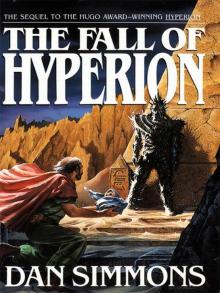 The Fall of Hyperion
The Fall of Hyperion Black Hills
Black Hills A Winter Haunting
A Winter Haunting Hard Freeze
Hard Freeze Prayers to Broken Stones
Prayers to Broken Stones Hard as Nails
Hard as Nails The Guiding Nose of Ulfant Banderoz
The Guiding Nose of Ulfant Banderoz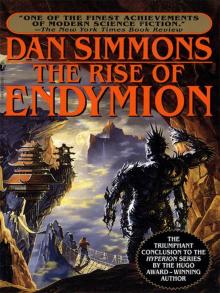 The Rise of Endymion
The Rise of Endymion Orphans of the Helix
Orphans of the Helix Lovedeath
Lovedeath Olympos
Olympos Darwin's Blade
Darwin's Blade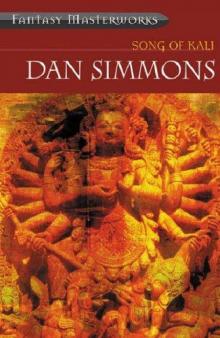 Song of Kali
Song of Kali Worlds Enough & Time: Five Tales of Speculative Fiction
Worlds Enough & Time: Five Tales of Speculative Fiction The Abominable
The Abominable The Death of the Centaur
The Death of the Centaur Hard as Nails jk-3
Hard as Nails jk-3 Worlds Enough & Time
Worlds Enough & Time Joe Kurtz Omnibus
Joe Kurtz Omnibus The Hyperion Cantos 4-Book Bundle
The Hyperion Cantos 4-Book Bundle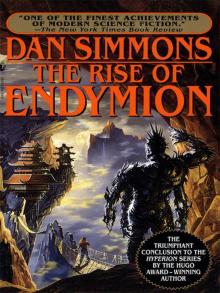 Rise of Endymion
Rise of Endymion Hard Freeze jk-2
Hard Freeze jk-2 Olympos t-2
Olympos t-2 The Abominable: A Novel
The Abominable: A Novel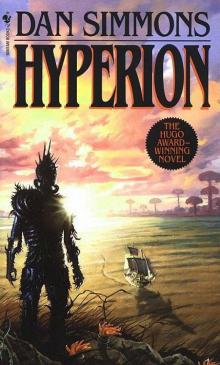 Hyperion h-1
Hyperion h-1 Remembering Siri
Remembering Siri Black Hills: A Novel
Black Hills: A Novel Ilium t-1
Ilium t-1 Hardcase jk-1
Hardcase jk-1 Hyperion 01 - Hyperion
Hyperion 01 - Hyperion